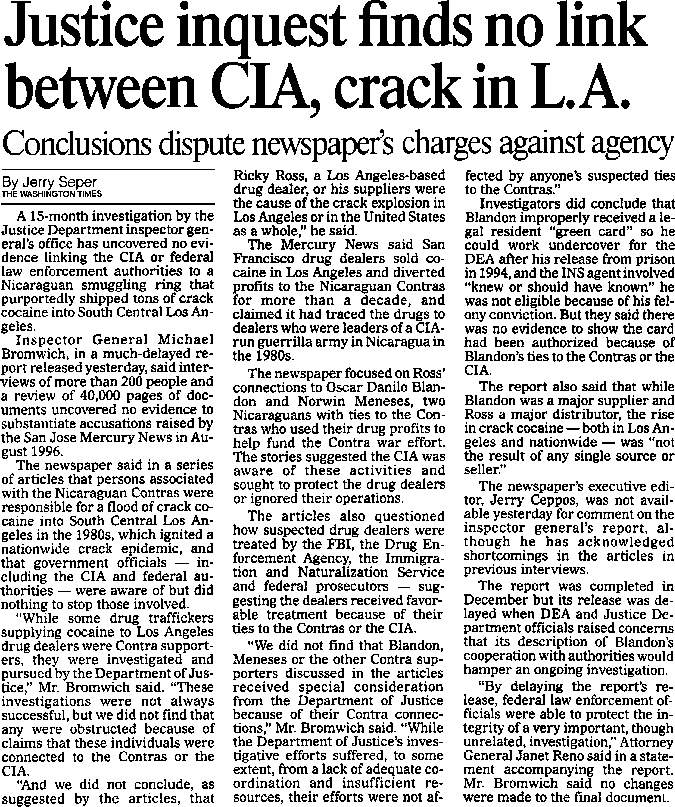
The Washington Post Friday, July 24, 1998
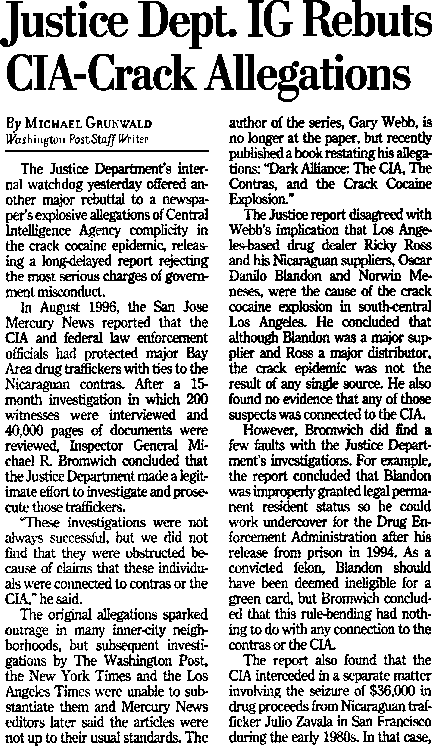
Friday, July 24, 1998 A5 Los Angeles Times
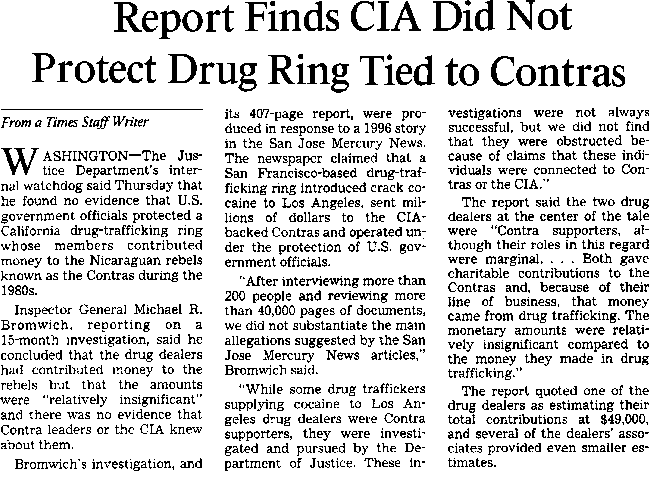
USDOJ/OIG - Semiannual Report to Congress, April 1, 1998 - September 30, 1998 |
Page 1 |
By Act of Congress, the Office of the Inspector General (OIG) was established in the Department of Justice (Department) on April 14, 1989. The OIG investigates alleged violations of criminal and civil laws, regulations, and ethical standards arising from the conduct of the Department's employees in their numerous and diverse activities. The OIG provides leadership and assists management in promoting integrity, economy, efficiency, and effectiveness within the Department and in its financial, contractual, and grant relationships with others. Many of our reports are available on the OIG's Website at the following Internet address: <http://www.usdoj.gov/oig> .
The OIG carried out its mission during this reporting period with a workforce averaging 450 special agents, auditors, inspectors, and support staff. The special agents are assigned to offices in Washington, D.C., Atlanta, Boston, Chicago, Colorado Springs, Dallas, El Centro, El Paso, Houston, Los Angeles, McAllen, Miami, New York, San Diego, San Francisco, Seattle, and Tucson. The auditors are located in offices in Washington, D.C., Atlanta, Chicago, Dallas, Denver, Philadelphia, and San Francisco.
Other OIG components—the Inspections Division, the Special Investigations and Review Unit, the Management and Planning Division, the Office of General Counsel (OGC), and the Inspector General's immediate office—are located in Washington, D.C.
The OIG's Fiscal Year (FY) 1998 direct appropriation was $33,211,000, with an additional $146,565 transferred from the Office of National Drug Control Policy in High Intensity Drug Traffic Area funds. The OIG also received reimbursements of (1) $5.0 million from the Immigration and Naturalization Service (INS) for audit, inspections, and investigative oversight work related to INS fee accounts; (2) $1.4 million from the Executive Office for U.S. Trustees for trustee audits; (3) $7.5 million from the Working Capital Fund and other Department components for costs incurred to comply with the statutory requirements of the Chief Financial Officers Act of 1990 and the Government Management Reform Act of 1994 to complete a consolidated Department financial statement audit in FY 1998; (4) $3.7 million from INS to cover the cost of a congressionally mandated investigation into Citizenship U.S.A. allegations; and (5) $3.8 million from the Violent Crime Reduction Trust Fund (VCRTF) for oversight of law enforcement grant programs funded through VCRTF.
USDOJ/OIG - Semiannual Report to Congress, April 1, 1998 - September 30, 1998 |
Page 2 |
A number of OIG special investigations are of significant interest to the American public and Congress and of vital importance to the Department. Teams working on these cases include senior attorneys, special agents, auditors, and inspectors. The following pages highlight these complex OIG investigations. Completed special investigative reports, except as noted, are available on the OIG Website at <http://www.usdoj.gov/oig>.
Allegations of Cocaine Trafficking by the Nicaraguan Contras
The OIG conducted a 15-month investigation into allegations contained in a series of San Jose Mercury News articles that individuals associated with the Nicaraguan Contras were responsible for flooding Los Angeles with crack cocaine in the 1980s, that these dealings started the U.S. crack cocaine epidemic, and that U.S. government officials—including Central Intelligence Agency (CIA) and federal law enforcement officials—were aware of these activities and either protected or ignored the individuals involved.
The OIG investigation focused on the Department's investigations and prosecutions relating to various aspects of these allegations. Our investigative team reviewed over 40,000 relevant documents collected from Department components and conducted over 200 witness interviews throughout the United States and Nicaragua.
Our 407-page report was completed in December 1997. However, the Attorney General invoked her authority to delay its release, pursuant to the Inspector General Act of 1978, as amended (IG Act), "because of law enforcement concerns unrelated to the ultimate conclusions reached in [the] report." In July 1998, the Attorney General indicated that the law enforcement concerns had abated, and the OIG released the report on July 22, 1998.
Our investigation did not substantiate the main allegations contained in the San Jose Mercury News. We did not find that any of the individuals cited in the San Jose Mercury News articles received special consideration or leniency by the Department because of their Contra connections. While the Department's investigative efforts suffered to some degree from a lack of coordination and insufficient resources, they were not affected by anyone's suspected ties to the Contras. We also did not find that the drug trafficking by individuals discussed in the articles was connected to the CIA or that their drug trafficking was the cause of the crack explosion in Los Angeles or across the country.
The Washington Times Friday, July 24, 1998

The Washington Post Friday, July 24, 1998

Friday, July 24, 1998 A5 Los Angeles Times

USDOJ/OIG - Semiannual Report to Congress, April 1, 1998 - September 30, 1998 |
Page 3 |
Special Inquiries
Operation Gatekeeper
The OIG investigation of Operation Gatekeeper—the Border Patrol's effort to stem the flow of illegal immigration across the U.S.-Mexico border between California and Baja California—began after officials of the National Border Patrol Council alleged that Operation Gatekeeper's achievements were being misrepresented to make it appear successful.
After conducting a thorough inquiry into the broad allegations of fraud in the reporting and performance of Operation Gatekeeper, we concluded that neither INS nor Border Patrol personnel attempted to falsify records or mislead the public about Operation Gatekeeper's success. Our 346-page report, issued in July 1998, detailed our findings and offered recommendations to address the operational and managerial failings that created an atmosphere where suspicions about Operation Gatekeeper flourished.
Federal Times July 27, 1998
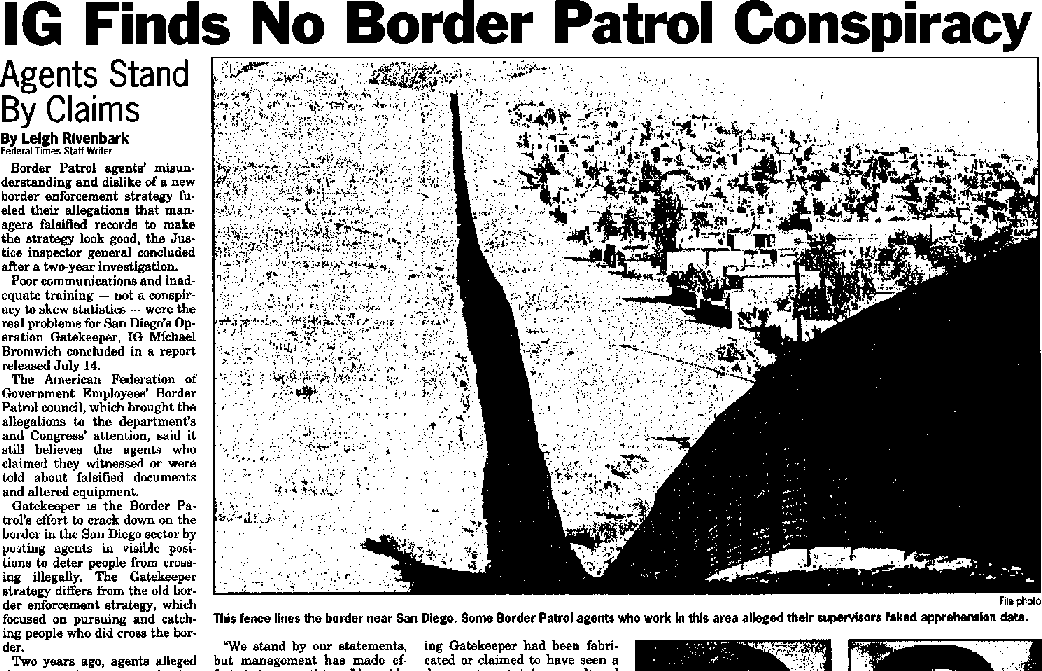
The Washington Post Wednesday, July 15, 1998
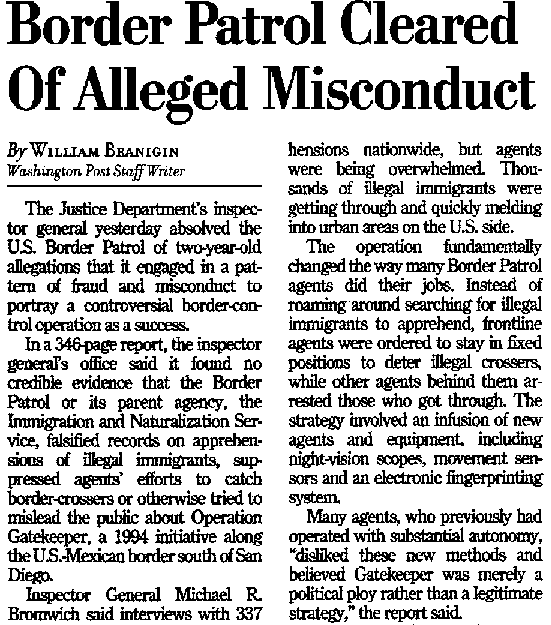
The Washington Times WEDNESDAY, JULY 15, 1998
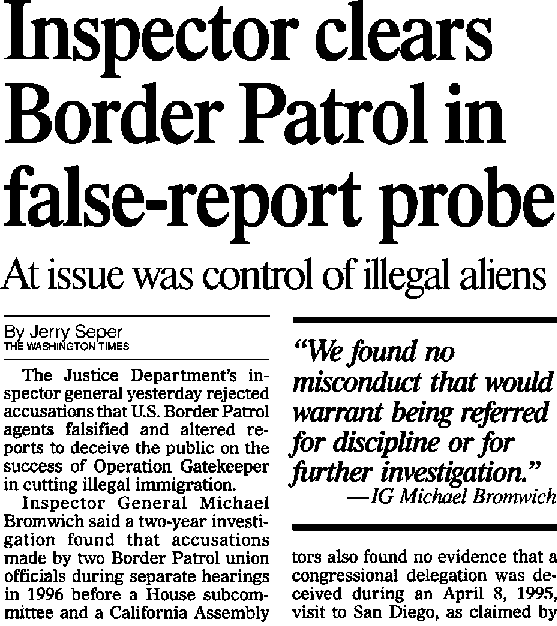
Citizenship U.S.A.
In September 1995, INS initiated Citizenship U.S.A. (CUSA), a program designed to substantially reduce the backlog of pending naturalization applications. Over one million individuals were naturalized during the year the program was in operation.
In May 1997, at the request of Congress and the Attorney General, the OIG began an investigation of CUSA following allegations of misconduct within the program, including allegations that applicants with disqualifying backgrounds were naturalized and that standards were compromised in an effort to maximize the number of persons eligible to vote in the November 1996 elections.
A team of attorneys and OIG special agents, inspectors, auditors, and support personnel continues to investigate these allegations. The team has conducted nearly 1,000 interviews of INS personnel and others and has reviewed tens of thousands of documents. The investigation is ongoing in six major cities—Chicago, Miami, Los Angeles, New York, San Francisco, and Washington, D.C.
USDOJ/OIG - Semiannual Report to Congress, April 1, 1998 - September 30, 1998 |
Page 4 |
Special Inquiries
Campaign Finance
In September 1997, the Attorney General and the Director of the Federal Bureau of Investigation (FBI) learned that classified intelligence information pertaining to the Department's campaign finance investigation may not have been appropriately disseminated within the FBI and the Department. In November 1997, the Attorney General asked the OIG to review how this intelligence information was handled. To date, we have reviewed over 15,000 pages of classified information and conducted over 100 interviews. The team is currently writing the report of investigation.
Lost Trust
In the late 1980s and early 1990s, the FBI and the U.S. Attorney's Office in South Carolina conducted a major investigation, called "Lost Trust," into corruption, vote-buying, influence peddling, and drug usage in the state legislature. After litigation that lasted over six years, a U.S. district judge dismissed all remaining charges on the grounds that "the government's repetitious, flagrant, and long-standing misconduct in connection with the investigation and prosecution of the legislators warranted dismissal." The Court alleged misconduct by the FBI, U.S. Attorney's Office, and the Department's Public Integrity Section. The Court also was critical of an earlier investigation by the Department's Office of Professional Responsibility (OPR).
At the request of the Deputy Attorney General, the OIG initiated a review of the prosecutions and investigations implicated in the Court's dismissal order. Our investigative team, led by two attorneys, is reviewing documents related to the investigation and prosecution of the cases and related documents generated by the Department's OPR and FBI's OPR. The team also is concluding interviews with the many persons involved in handling these cases and is beginning to prepare its report.
ICITAP/OPDAT
The Criminal Division's International Criminal Investigative Training Assistance Program (ICITAP) and Overseas Prosecutorial Development Assistance and Training (OPDAT) office are designed to foster, support, and strengthen democratic principles and structures of law enforcement in foreign countries. Particularly in those countries that recently have embraced democracy, ICITAP and OPDAT provide training for police, prosecutors, and the judiciary and advice on American laws and programs to combat crime within a democratic framework.
In April 1997, the OIG began an investigation of ICITAP and OPDAT following allegations of program mismanagement and supervisory misconduct. The investigative team of special agents, auditors, inspectors, and support personnel, under the direction of a senior attorney, has conducted more than 300 interviews in the United States and several foreign countries and has reviewed over 50,000 pages of documents. The investigation is ongoing.
USDOJ/OIG - Semiannual Report to Congress, April 1, 1998 - September 30, 1998 |
Page 5 |
Special Inquiries
Trentadue
Kenneth Trentadue, an inmate held at the Federal Transfer Center in Oklahoma City, Oklahoma, was found dead in his cell in August 1995. The Bureau of Prisons (BOP) concluded that Trentadue committed suicide by hanging. However, allegations that Trentadue was murdered led to an investigation by the FBI and the Department's Civil Rights Division. The investigation concluded that there was insufficient evidence of a violation of federal criminal civil rights laws. Following that investigation and at the Deputy Attorney General's request, the OIG initiated a separate review focusing on whether BOP or FBI employees mishandled evidence or engaged in other misconduct in the events surrounding Trentadue's death. The investigation is ongoing.
FBI Laboratory
In March 1998, the OIG conducted an in-depth review of the FBI's progress in implementing recommendations made in the OIG's 1997 report on the FBI Laboratory. The OIG used many of the same attorneys, scientists, and investigators who conducted the original investigation. The OIG team interviewed examiners and supervisors and reviewed FBI Laboratory policy statements, manuals, and other documents. In June 1998, the OIG released a "one-year-later" follow-up report on the FBI Laboratory, which found significant progress toward implementing the recommendations made in the 1997 report.
The follow-up report noted that while the FBI generally had done a responsible job of implementing the OIG's recommendations, recommendations regarding staffing of the Laboratory's Explosives Unit with qualified scientists and monitoring of examiner testimony were not yet implemented.
The Washington Post Friday, June 5, 1998
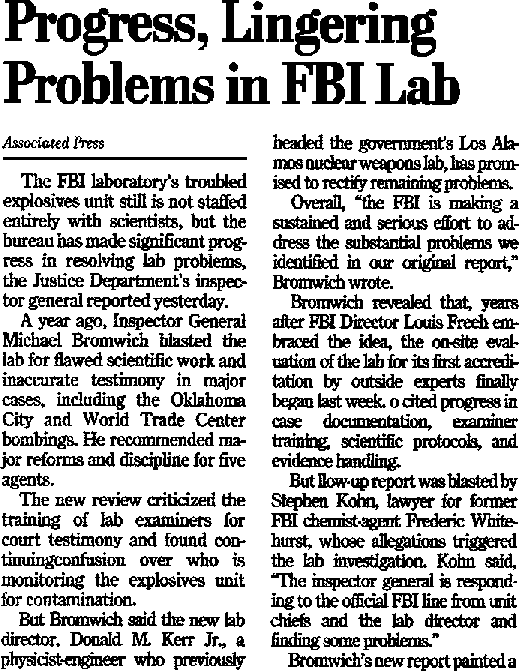
USDOJ/OIG - Semiannual Report to Congress, April 1, 1998 - September 30, 1998 |
Page 6 |
Other OIG Contributions
OIG semiannual reports feature the major investigations and programmatic reviews performed by the OIG during the past six months. In addition, the OIG has engaged in other noteworthy activities that significantly contribute to the Department and the governmental community.
· In May 1998, the Investigations Division's Miami Field Office sponsored a 2-day Training Symposium, Sexual Abuse, Contraband Smuggling, and Civil Rights Investigations in Prisons. Officials of BOP, FBI, Criminal Division, and U.S. Attorney's Office for the Southern District of Miami assisted in the presentations. Symposium attendees were given an overview of the applicable violations of federal laws as well as information about the available resources and challenges encountered while conducting investigations in a prison environment.
· During this reporting period, the Investigations Division's Research and Analysis Unit, with assistance from BOP's research and internal affairs offices, began work on its initial research project—the Federal Bureau of Prisons Corruption Study. The initiative provides an opportunity to implement detection and prevention strategies based on empirical research.
As part of the project's initial phase, the research team identified a study population of former BOP corrections employees who were arrested, terminated, or resigned from service between 1990 and 1997. The research team developed a data collection instrument, which is being used to collect personal and offense data for each of the former employees.
· Investigators conducted 24 Integrity Awareness Briefings for Department employees throughout the country. These briefings are designed to educate employees about the misuse of a public official's position for personal gain and to deter employees from committing such offenses. The briefings reached over 650 employees with a message highlighting the devastating consequences of corruption to both the employee and the agency.
· The Audit Division participated in INS' Intergovernmental Service Agreement (IGA) Working Group, whose purpose is to establish uniformity in how INS awards contracts to state and local governments for detention facilities. Auditors provided technical expertise, reviewed proposed IGA applications, and discussed Audit experiences with the U.S. Marshals Service's IGA program.
· The Audit Division continued to monitor INS' critical automation initiatives to enhance automated data processing operations. Auditors attended INS' quarterly meetings to monitor their effective use of automation resources and provided input regarding INS' monitoring of these initiatives.
USDOJ/OIG - Semiannual Report to Congress, April 1, 1998 - September 30, 1998 |
Page 7 |
Other Activities
· The OIG participated in the Attorney General's Committee on Sexual Harassment that developed a departmentwide plan to combat sexual harassment. Each component and bureau implemented a plan based on the Department's plan. In addition, the OIG participated in subcommittees to develop an ombuds program for the Department and to develop a new, additional investigative resource for the Offices, Boards, and Divisions for sexual harassment cases.
· The OGC currently serves as a member of the Department's Intercomponent Adverse Action Work Group, which is developing and implementing a number of significant improvements to the Department's disciplinary, adverse action, and grievance procedures. OGC provided the working group with a detailed memorandum discussing the state of the law concerning discipline of federal employees for off-duty misconduct and an outline for recommended adverse action training for Department employees, managers, and supervisors.
Inspector General Congressional Testimony
On June 10, 1998, the IG testified before the House Permanent Select Committee on Intelligence concerning legislation that would create a whistleblower procedure for employees of specified intelligence agencies, including the FBI, to follow in order to bring to the attention of Congress complaints or information about intelligence activities that involve classified information. The testimony is available on the OIG Website at <http://www.usdoj.gov/oig>.
Legislation and Regulations
The IG Act directs the IG to review proposed legislation and regulations relating to the programs and operations of the Department. Although the Department's Office of Legislative Affairs reviews all proposed or enacted legislation that could affect the Department's activities, the OIG independently reviews proposed legislation that affects it or legislation that relates to fraud, waste, and abuse in the Department's programs or operations.
During this reporting period, the OIG reviewed and commented on more than a dozen pieces of proposed legislation including revisions to the IG Act, modification of a requirement that INS develop an automated entry/exit control system by October 1, 1998, and creation of a mechanism to encourage whistleblowers from the intelligence community to report allegations of wrongdoing that involve classified information.
USDOJ/OIG - Semiannual Report to Congress, April 1, 1998 - September 30, 1998 |
Page 8 |
Other Activities
President's Council on Integrity and Efficiency Activities
The IG is a member of the President's Council on Integrity and Efficiency (PCIE). OIG staff participate in PCIE activities—such as the Inspections Round Table, an annual investigations conference, meetings of the Chief Financial Officers Group, and the OIG GPRA (Government Performance and Results Act) Coordinators' Interest Group—that relate to their respective duties. During the reporting period, the IG was a member of the Investigative Standards and Training Committee and the Legislation Committee.
The Investigative Standards and Training Committee reviews issues such as quality standards for investigations and criminal investigator training standards and makes recommendations to the full PCIE. During this reporting period, the Committee completed a study and recommended several improvements to the IG Academy that include developing a new financial management system, selecting a course developer/program manager, and establishing operational policies for funding the IG Academy. To improve communications with the investigative function of IGs, the Committee also created an Investigations Advisory Subcommittee. The Subcommittee will advise the Committee on policy, training, and investigation practices.
The Legislation Committee focused much of its attention this reporting period on a legislative proposal to amend the IG Act. The legislation would, among other things, provide for renewable 9-year terms for Presidentially-appointed IGs, require external reviews for all IGs every three years, convert semiannual reporting periods to annual reporting cycles, and transfer some of the smaller IGs into larger IGs. The Committee prepared written testimony on the legislation and the state of the IG community for a September 9, 1998, hearing on the bill before the Senate Governmental Affairs Committee.
Office of Investigative Agency Policies
The OIG is a member of the Office of Investigative Agency Policies (OIAP), which is composed of the Department's law enforcement components and which develops coordinated policies for law enforcement activities. Among the issues addressed by the OIAP this reporting period were guidelines on warning persons and notifying law enforcement agents of threats to life or serious bodily injury, disclosure of law enforcement employee names to the media, and timely entry of fugitive information into the National Crime Information Center database.
NOTE: Page 9 was intentionally left blank.